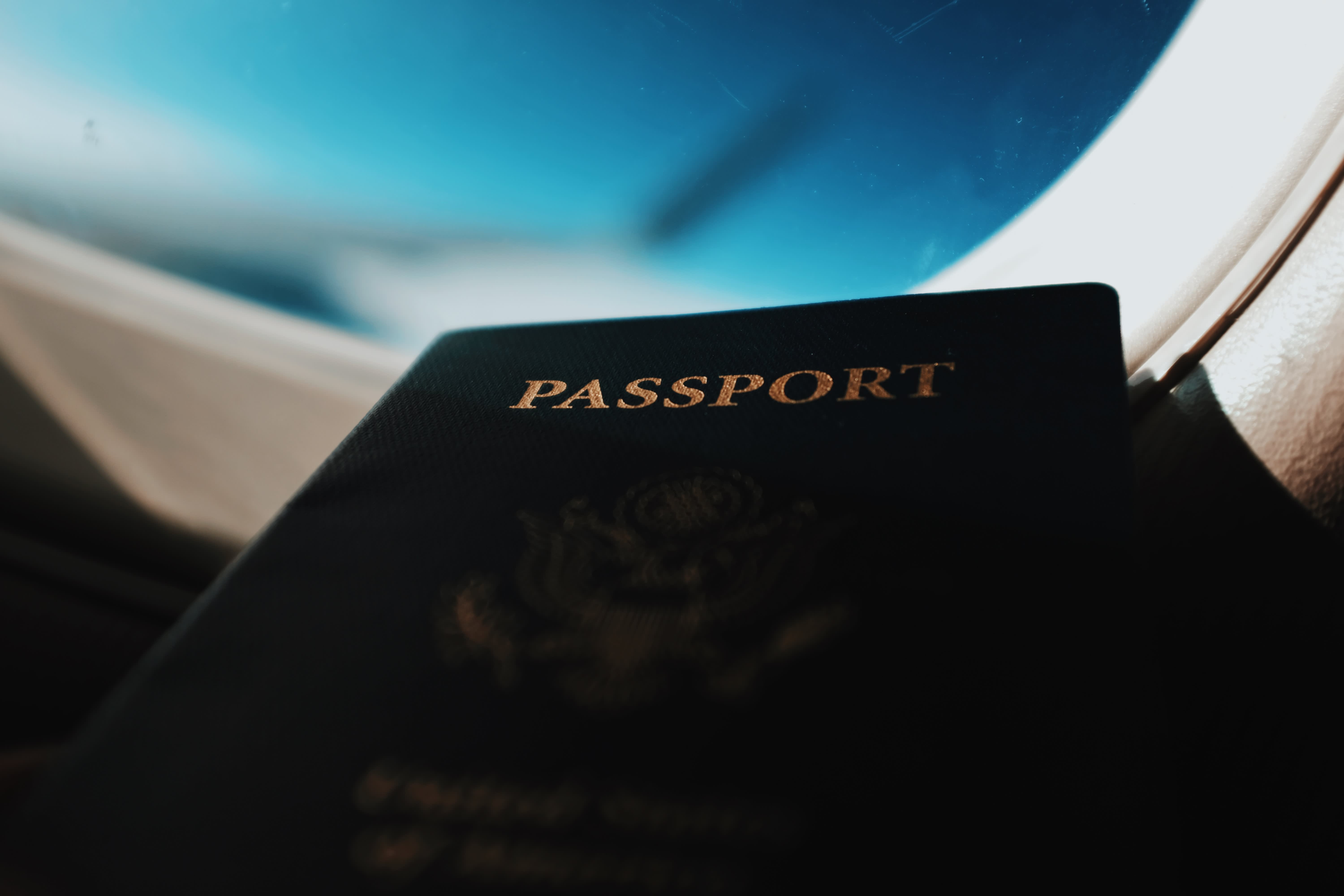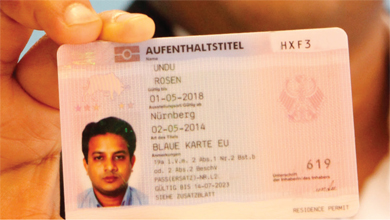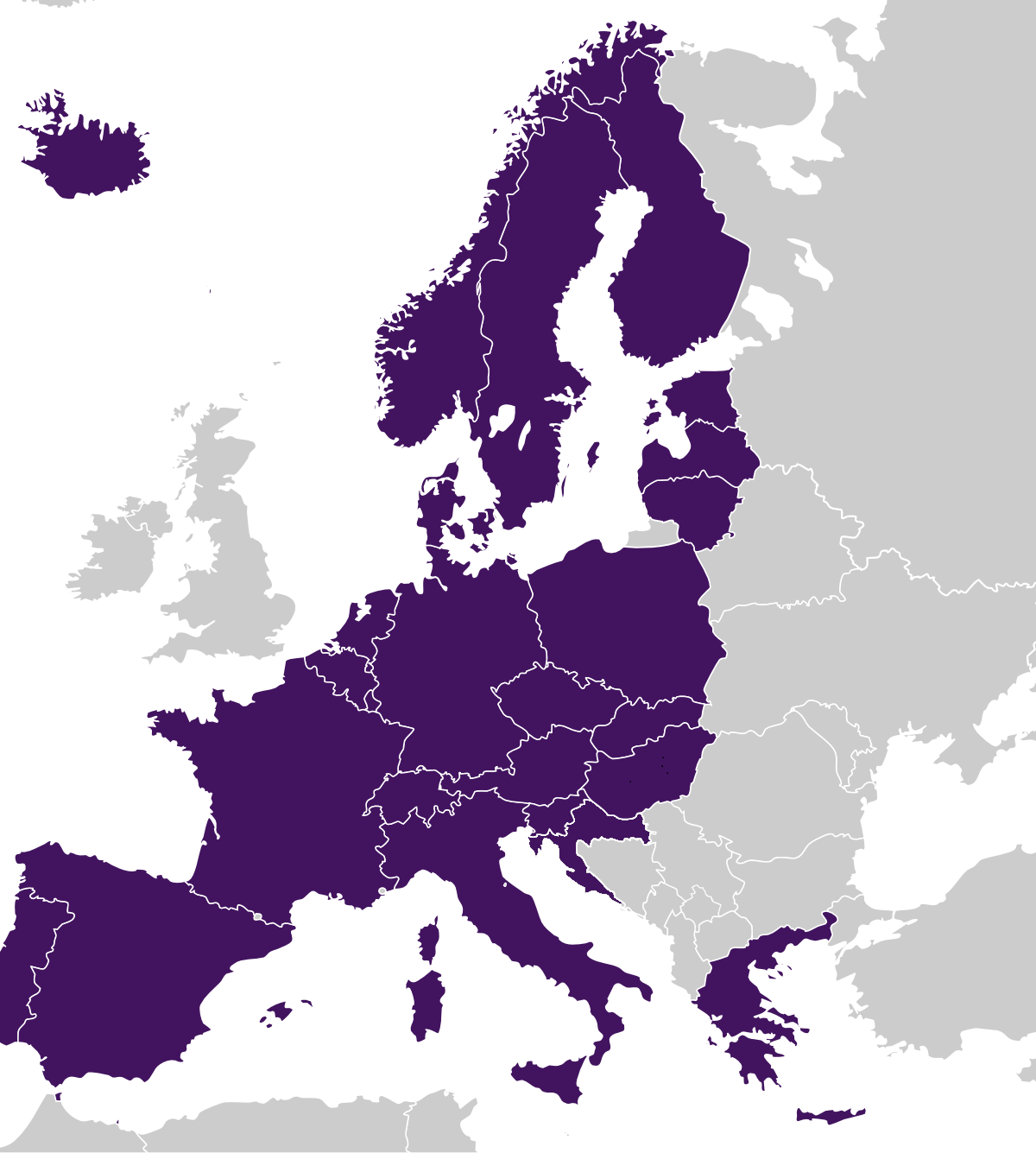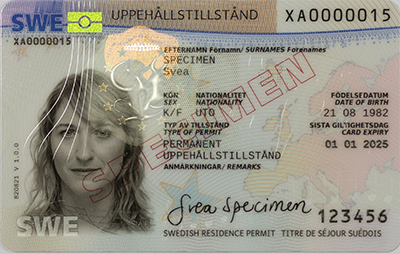Travelling with a German residence permit

So, you’ve managed to secure your German residence permit but you need to travel abroad. You don’t want to risk losing your hard-earned permit, so let’s take a look at the rules surrounding travel while holding a German residence permit .

Why would I travel when I have a German residence permit?
When you’re holding a German residence permit, you’re not a German citizen yet. You don’t have access to all the freedoms that a German passport would grant you. Which is actually quite a lot, as it’s one of the most powerful passports in the world. That said, the process of becoming eligible to become a full German citizen can take anywhere from 5 to 8 years. That’s a long time to not see your family or take a vacation abroad.

Where can I travel with my German residence permit?
Holding a residence permit in Germany (or any other Schengen country, in fact) entitles you to free movement within the Schengen zone for the duration of your visa or permit. There are no border checks or restrictions within the Schengen zone , but you do need to be able to present both your passport and your residence permit to any border or police units you might encounter along the way.
A German residence permit or visa alone entitles you to only travel to other Schengen countries. Remember, though: the Schengen zone and the European Union aren't the same thing!
There are some EU-countries, such as Ireland, Romania & Bulgaria – that are members of the European Union, but aren't taking part in the Schengen agreement. If you want to visit them, you'll still need a visa based on the requirements surrounding your current passport .
This also works the other way around! There are countries that aren’t part of the EU, but are a part of the Schengen zone: Iceland, Liechtenstein, Norway and Switzerland but are still part of the Schengen zone. So, you are free to travel to these countries without a visa, as long as you hold your German residence permit!
Travel outside the Schengen zone
If you have a residence permit that allows you to stay for more than 3 months, you’ve probably got one that allows you to work in Germany or to volunteer in Germany. These permits are generally valid as long as the employment contract they are depending on. As I mentioned before, you don’t have a German passport yet, so for now, your foreign travel ability outside of the Schengen zone still depends on the passport of the nationality you have right now. So, if someone with a German passport doesn’t need a visa to enter country A, but the passport from your country of origin does require you to get a visa first, you still need a visa.

My visa is close to the expiration date
Generally, your visa or permit needs to be valid for longer the duration of your travels. If your permit's due to expire within your travel period, you should wait until you have confirmation that your application has been accepted for processing before you travel. Schengen customs agents have access to this information, so they will be able to see that you have an application in process and will allow you to continue your travels.
How long can I travel with my German residence permit?
The exception to this is the Schengen zone and some other countries in the EU. As long as you stay within countries in the Schengen zone, you’re free to travel around as much as you like for up to 90 days within a 6 month period! If you’re leaving the Schengen zone and come back through a different Schengen country, you need to be able to prove your final destination is going to be Germany. Additionally, if you’re looking to apply for German citizenship, you need to live in Germany for at least 180 days of the year!
What if I’m away for too long?
If you’re away for too long, or you leave Germany for a reason that's ‘not of a temporary nature’, then your permit can expire or be revoked. Being away for too long, in this case, means leaving the country without re-entry within 6 months. There can be exceptions to this rule, as the length of time can be adjusted by the German immigration authorities.
So, if you’ve a good reason, such as taking care of your elderly parents, working as an aid worker, being sent abroad while working for a German company or studying at a German university and taking part of an exchange program for multiple semesters. If you’re a Blue card holder who came to Germany as a specialised worker you can leave Germany for a period of up to 12 months, as long as you consult with the German immigration office before your departure.

Additionally, your permit can be revoked if Germany determines that you’re leaving for reasons that aren't of a temporary nature . In other words, if the authorities determine Germany is no longer your primary country of residence, they might revoke your permit. Reasons for this could be moving your family to a different country, taking up long term employment in a different country or selling/leaving your German property. You could try to keep your permit by making regular trips back to Germany, but German judges have rules against people doing this in the past.
Please reach out to [email protected] if you have any suggestions or inquiries about the content on this page.
Related Articles

How to get your German work visa: Step-by-step guide
How to become a German citizen as an expat

How to move to Germany in 14 simple steps (2023-2024)
Find your home in Germany
Find accommodation in cities across Germany. Search for your accommodation now!
What are you looking for?
I am a foreigner living in germany and am planning a trip abroad. do i need a valid passport and visa.
As a foreigner you are requested to hold a valid passport or document in lieu of a passport at any time. In general, the issuance and extension of foreign passports have to be applied for at the competent foreign missions in Germany, except for recognized asylum seekers, recognized refugees according to the Geneva Refugee Convention, stateless persons or those entitled to subsidiary protection. The mentioned groups are mostly issued a passport in lieu of a passport (Passersatzpapier) by the local Immigration Office (Ausländerbehörde) at the place of residence. There are three types of those documents:
- Travel document for refugees (“Blue Passport”)
- Travel document for stateless persons
- Travel document for foreigners
Holders of Blue Passports are in general allowed to travel to all the countries which have signed the Geneva Refugee Convention. Please note that for many of these countries, however, you may have to apply for a visa in advance. Information on visa provisions for non-German citizens wanting to travel to a third country can only be provided by the respective foreign mission of the country concerned. The addresses of the foreign missions in Germany are available here:
Foreign Missions in Germany
However, you are not allowed to travel to your country of origin - this would imply that you no longer need humanitarian protection; you risk losing your asylum in Germany if you travel to your home country.
Foreign nationals who are in possession of a valid German residence title (Aufenthaltstitel) may travel for a period of up to 90 days within 180 days to other Schengen-States, so do not need a visa. This applies as well to holders of a German Visa of the category “D”.
In both cases, general entry requirements of Article 6 Section 1 letters a, c and e of the Regulation ( EU ) 2016/399 of the European Parliament and of the Council of 9 March 2016 on a Union Code on the rules governing the movement of persons across borders (Schengen Borders Code) are fulfilled and the person is not listed by the relevant Member State as not permitted.
In case of doubt please get in touch with the competent mission of the country in Germany.
- Who are Member States of the Schengen Agreement?
- Vertretungen anderer Staaten: Länder A-Z
- Schengen Border Code
- Travelling abroad for refugees (Handbook Germany)
- Visa regulations
- Top of page
- NETHERLANDS
- SWITZERLAND
Official issues
Residence permit in germany.

If you want to live and work in Germany as an expat, you may need to apply for a residence permit ( Aufenthaltstitel ). The type of permit you apply for depends on both your nationality and on your reason for relocating to Germany, whether that be family , work, studies or something else. If you have a national visa, you can convert it into the corresponding type of residence permit.
Do I need a German residence permit?
Whether you need a German residence permit depends on your nationality and the amount of time you will spend in Germany.
EU and EEA citizens
Citizens of EU/EEA countries have open access to the German labour market. Expats from these countries can freely live and work in Germany without a visa or residence permit. Remember that if you stay in Germany for more than three months you need to register at your local citizens’ office ( Bürgeramt ) .
Swiss Citizens
Nationals of Switzerland also have freedom of movement within the EU, but if you want to live and work in Germany you need to apply for a special declaratory residence permit for Swiss nationals at your local Foreigners’ Office ( Ausländerbehörde ).
Non-EU / EEA citizens
Citizens from outside the EU and EEA may need to apply for a German residence permit.
Short stays (business and leisure): German residence permit not required
You do not need a residence permit for business or leisure stays in Germany of less than 90 days, although, depending on your nationality, you may require a Schengen visa.
Short stays (taking up employment): German residence permit required
If you plan on working in Germany, even if you are staying for less than 90 days, you will need to apply for a national visa and then convert it into a residence permit.
Longer stays: German residence permit necessary
If you will be staying in Germany for more than 90 days, you will need to apply for a residence permit. Residents of Australia, Canada, Israel, Japan, New Zealand, the Republic of Korea and the United States of America may enter Germany without a visa and then apply for a residence permit from inside Germany.
Citizens of other countries will need to apply for a national visa (which functions as a provisional residence permit) at the German mission in your country of residence before you travel to Germany. Once you have arrived in Germany, you can convert your visa into a residence permit at the Foreigners’ Office.
If you will not have a source of income in Germany, you will also need to open a blocked bank account , either before you arrive in Germany (if you need to apply for a visa), or before you submit your residence permit application.
Types of German residence permit
For those wanting to live and work in Germany, there are three different types of residence permit.
Temporary residence permit ( Aufenthalterlaubnis )
The temporary residence permit is the most common type of permit issued to expats in Germany. It is generally valid for one year and can usually be extended as long as your circumstances stay the same.
It is linked to the purpose of your stay and the information you provided in your visa application (if you submitted one). Visit our temporary residence permits page to learn about the types of temporary residence permits you can apply for.
Permanent settlement permit ( Niederlassungserlaubnis )
After residing in Germany for a certain amount of time, all expats possessing a residence permit are entitled to apply for a permanent settlement permit. This is usually five years but can be less for highly-qualified workers or graduates of German universities.
The settlement permit grants you the right to remain in Germany without time restrictions, making it an attractive option if you would like to stay indefinitely. See if you are eligible for the permanent settlement permit .
German residence permit application procedure
The application procedure for a German residence permit can seem daunting, especially if you don’t know what to expect. There are several steps, including registering and obtaining health insurance , that you must take before you can apply for a residence permit.
Visit our residence permit application procedure page to get all the information you need regarding the application process: the requirements for the different types of residence permit, the documents you will need and the costs involved.
Do I need a work permit as well as a residence permit?
As of December 2011, the application procedure for permits to work and reside in EU Member States has been simplified. Rather than having to apply to different entities for permission to live and work, a single permit now covers both.
Having a residence permit does not, however, automatically grant you the right to pursue economic activity. The type of residence permit you apply for will determine whether or not you are entitled to work. If for any reason you are unsure, the documents you receive with your residence permit will indicate explicitly whether you are permitted to work.
What happens if my German residence permit application is rejected?
If your application is rejected, you will receive a letter outlining the reasons for the refusal. The most common reason for a rejection is failing to provide the correct corroborating documents. The letter will explain the next steps to take, including how to lodge an appeal, if applicable.
How can I renew my German residence permit?
Temporary residence permits in Germany are usually valid for one year. Note that the foreigners’ office does not routinely notify you if your residence permit is due to expire. It is therefore wise to make note of the expiry date of your residence permit and take steps to renew it well in advance.
Extending your temporary residence permit in Germany is largely a formality as long as your personal circumstances are the same as when you originally applied. If your employment, marital or financial status changes significantly you should contact your local foreigners’ office to check how this impacts your residency status.
It is essential to renew your residence permit long before its expiry date to avoid an illegal stay which may mean you are banned from entering Germany in the future. The cost of renewing a residence permit is usually 50-80 euros, depending on location and the complexity of your case.
Follow us on Facebook

Lawyers & Legal services in Germany

Relocation services & Companies in Germany

Temporary residence permit in Germany

Permanent residence permit in Germany

Residence permit application procedure in Germany

Information and types of visa for Germany

Blocked bank account in Germany (Sperrkonto)

International money transfers: How to send money to & from Germany

Integration & Certification in Germany

German courses
Site navigation and service
Service menu.
- Shopping cart
Information collection
The authority, you are here:.
- Migration and residence
- Immigrants from third countries
Mobility in the EU
Lawful residence in one Member State of the EU gives rise to an entitlement to enter and live in other EU Member States, subject to specific prerequisites.

This content is also available in
Mobility in the European Union
The schengen states are:.
Austria, Belgium, the Czech Republic, Denmark, Estonia, Finland, France, Germany, Greece, Hungary, Iceland, Italy, Latvia, Liechtenstein, Lithuania, Luxembourg, Malta, the Netherlands, Norway, Poland, Portugal, Slovakia, Slovenia, Spain, Sweden and Switzerland.
Lawful residence in one Member State of the EU gives rise to an entitlement to also enter and stay in other EU Member States, subject to specific prerequisites. This possibility of mobility between different European countries makes the European Union and Germany particularly attractive destinations for immigrants. Factors to be considered here are the intended duration of stay and whether employment is to be taken up.
If you are a third-country national and hold a residence title from a Schengen State, you may stay in another EU State for up to 90 days if you do not take up gainful employment there. The same applies if you are exempted from the visa requirement for a short stay in the European Union. Your overall stay in the EU must not exceed 90 days in the latter case.
If you are a third-country national and wish to stay in another Member State for more than 90 days, or if you intend to work in another Member State, you will also require a residence permit issued by the EU Member State concerned.
The legal basis
- Section 15 of the Residence Ordinance - Common provisions on short stays
- Section 17 of the Residence Ordinance
- Section 39 Nos. 3 and 6 of the Residence Ordinance - Extension of a stay in Germany for longer-term purposes
- Art. 6 Regulation (EU) 2016/399 - Entry conditions for third-country nationals
- Art. 21 of the Convention implementing the Schengen Agreement - Residence with a residence title issued by a Member State
- Art. 1 of Regulation (EC) no. 539/2001 on the visa requirement and exemption from same
Mobility with the EU Blue Card
If you hold an EU Blue Card, you are entitled to an EU long-term residence permit after five years. Both times spent in Germany, as well as periods in which you have lived in another EU Member State, will count towards this qualification period.

Mobility in the EU in case of intra-corporate transfer
If you are a manager, specialist or trainee of a company from a third country, it is possible for you to come to Germany and other EU States by way of an intra-corporate transfer and to work for your company here.

Studying throughout Europe
The EU's mobility arrangements enable you to also study in other Member States (with the exception of the United Kingdom, Ireland and Denmark) for up to 360 days if you hold a residence title for study purposes.


Europe-wide research activities
A German residence permit for research purposes also enables you to spend a limited period researching and teaching in other EU States.

Mobility with an EU long-term residence permit
An EU long-term residence permit enables you to enjoy the legal benefits of long-term resident status and have extended mobility rights in other EU Member States.

Further information
- Make it in Germany
Unterseiten zu diesem Thema
- Mobility: EU Blue Card
- Mobility: ICT Card
- Mobility: Students
- Mobility: Researchers
- Mobility: EU long-term residence permit
Travelling within the Schengen Area with a residence permit or visa
You want to travel within the Schengen Area. Find out which countries belong to the Schengen Area and with which document you are allowed to travel within it. Also find out how long you are allowed to travel within the Schengen Area with that document.
Schengen countries
Documents required to travel within the schengen area, the netherlands is part of the schengen area. the schengen area consists of different european countries. there are no border controls within the schengen area. the schengen area consists of the following countries:.
- Czech Republic
- Denmark (without the Faeroes and Greenland)
- France (without French Guyana, Guadeloupe, Martinique, Réunion)
- Liechtenstein
- Netherlands
- Norway (without Spitsbergen)
- Portugal (including the Azores and Madeira)
- Spain (including the Balearic and Canary Islands)
- Switzerland
Cyprus and Ireland are not Schengen countries.

Do you want to travel within the Schengen Area? Then you need specific documents. Find out with which document you are allowed to travel within the Schengen Area and how long you are allowed to travel with that document.
Passport or other travel document always required.
You always need a passport or other travel document for a journey abroad. This is also the case for a journey within the Schengen Area. Your passport or travel document must not have been issued more than 10 years ago. The passport or other travel document must also be valid for at least another 3 months after you leave the Schengen Area.
Travellers with the nationality of a Schengen country
Travellers with the nationality of a Schengen country are free to travel to all countries in the Schengen Area. They do not need any extra document besides their passport or other travel document.
Travellers with residence permits
What if you do not have the nationality of a Schengen country but do have a valid Dutch residence permit? Then you are allowed to be in the Schengen Area for up to 90 days within a 180-day period. Besides your passport or other travel document, take your residence permit with you when you travel.
Travelling in the Netherlands after your residence permit has expired
Is your residence permit expiring and you will not continue to live in the Netherlands? But do you wish to stay in the Netherlands for an additional maximum of 90 days after the end of your permit? Read about a short stay after end of residence permit .
Travellers with a provisional residence permit (mvv)
Do you not have a residence permit, but you do have a valid provisional residence permit (in Dutch: machtiging tot voorlopig verblijf or MVV)? Then you are allowed to enter and exit the Netherlands and other countries in the Schengen Area. The MVV is a sticker in your passport.
Other travellers
You do not have the nationality of a Schengen country. Nor do you have a valid residence permit or valid provisional residence permit (MVV). In that case you sometimes need a visa to travel in the Schengen Area. This can be a single-entry visa or a multiple-entry visa.
No visa needed
Do you not need a visa? Then you are allowed to be in the Schengen Area in the visa-free period for up to 90 days within a 180-day period. In this period you are allowed to enter and exit the Schengen Area several times. You do not need an extra document besides your passport or other travel document.
Do you want to be in another Schengen country for a short stay? Then you do not have to first leave the Schengen Area. Do contact the authorities of the country you want to visit.
Single entry visa
You have a valid single-entry Schengen visa. You may enter the Schengen Area once with this visa. You may be in the Schengen Area for up to 90 days within a 180-day period. When you arrive in the Schengen Area, you must show that the Netherlands is your destination.
Multiple entry visa
You have a valid multiple-entry Schengen visa. You may enter and exit the Schengen Area several times with this visa. You may be in the Schengen Area for up to 90 days within a 180-day period. The first time you enter the Schengen Area you must show that the Netherlands is your destination.
- Travelling with a residence permit and return visa
- Apply for a Schengen visa
Being photographed and having your fingerprints taken
Everyone who is going to receive a residence permit card has to be photographed. Children under the age of six do not need to have their fingerprints taken. Anyone who cannot be fingerprinted for physical reasons, such as permanent finger injuries, does not have to have their fingerprints taken either.
Your fingerprints and photo are only stored on the card chip, not anywhere else. For that reason you have to be photographed again, and have your fingerprints taken again, every time you need to have a new residence permit card issued. There is no charge for the issuing of residence permit cards other than the application fee for the permit.
If you are outside of Sweden
If you need an entry visa to travel to Sweden, you must go to the Swedish embassy or consulate-general as soon as possible to be photographed and have your fingerprints taken if you did not do so when you presented your passport. You need to be photographed and provide your fingerprints even if you have had a residence permit card previously because your photo and fingerprints cannot be saved.
Not all embassies have the facilities to photograph you and take your fingerprints. Read more on the embassy's or consulate-general's website before going there.

If you don’t need a visa to travel to Sweden, you will be photographed and fingerprinted in Sweden. You must visit the Migration Agency as soon as possible after receiving a residence permit and arriving in Sweden.
If you are in Sweden
If you wish to extend a permit in Sweden or if you need a new residence permit card then you need to visit the Swedish Migration Agency to have your photograph and fingerprints taken if you did not do so when asked to present your passport. This also applies to people applying for protection in Sweden who do not have a permit here already.
When you visit the Swedish Migration Agency, you must have your passport with you. When the residence permit card is ready, it will be sent to your address in Sweden. Therefore it’s important you can provide your address in Sweden when you go to the Swedish Migration Agency to have your fingerprints taken and be photographed.
Book an appointment with the Migration Agency for having your photograph and fingerprints taken
The Migration Agency's visiting addresses and opening hours
If you change your address
If you want your residence permit card to be sent to your home we need your address. If you have moved you can state your new address when you visit the Migration Agency. Remember to tell us if you’re living with someone else and have a c/o address.
When the residence permit card is ready
If you were photographed and fingerprinted at an embassy or consulate-general you will receive your card from them. Ask the embassy or consulate if they will send it to you or if you have to go there to pick it up. Once you’ve got a decision to grant you a residence permit it can take up to four weeks to manufacture the card and send it to the embassy or consulate-general.
If you were photographed and fingerprinted at the Migration Agency your card will be sent to your home address within one or two weeks.
Your residence permit card is manufactured when the decision is made, but no earlier than six weeks before the validity of the residence permit begins.
It is not possible to speed up the manufacturing or delivery of the card.

Data contained on the card
The residence permit card contains information about what type of permit you have and how long your card is valid for, among other things. Your personal data is also on the card. On the back of some cards is the text “Permitted to work” (“ Får arbeta ”). This is when the decision you received doesn’t directly indicate that you have the right to work, such as when you’ve been granted a permanent residence permit. But if you were granted a work permit in Sweden to begin with, the decision will say that you have a work permit, and therefore your card doesn’t need to have the text “Permitted to work” on the back. For children, the text is included (where applicable) from the time they turn 16.
Check the information on your card
Always check that the name on your residence permit card is the same as the name in your passport. If your card has the wrong name you have to visit the Migration Agency or the embassy in order to get a new one. Take your passport with you.
If you change your name you first need to contact the Tax Agency, which is responsible for the population register, in order to register your new name. Then you have to visit the Migration Agency in order to get a new residence permit card.
When you travel
When you travel you have to show the residence permit card together with your passport. With the passport and the residence permit card, you can enter and travel within the Schengen area for up to 90 days during a period of 180 days. If you travel to a country outside of the Schengen area you may need a visa.
The residence permit card cannot by itself be used as an identity document or a travel document.
The card’s period of validity
A residence permit card for a permanent residence permit is valid for three years, but if you have a long-term resident's permit in the EU, your residence permit card is valid for five years. A five-year period of validity also applies to residence permit cards issued before 1 January 2022.
You will get a new residence permit card every time you are granted a new or extended residence permit. When you need a new residence permit card, you will be photographed and fingerprinted again. Always bring your old residence permit card when you come to the Swedish Migration Agency to get a new card.
If you lose the card
If you lose your residence permit card, or if it gets stolen, you must first report this to the police. Then you have to visit the Migration Agency in order to have your photograph and fingerprints taken for a new card. Take a copy of the police report you received from the police, either when you made the report or afterwards by post.
If you haven’t received your card
Have you been waiting a long time for your residence permit card? The reason may be that the card has been returned to the Migration Agency. This can happen if the Migration Agency has the wrong address for you.
Contact information to the Migration Agency
Last updated: 2024-01-15
Accueil > Fact sheet: residence permit
Fact sheet: residence permit
Date of update
You are a citizen European Union nationals, European Economic Area national or Switzerland national?
You do not need a visa, work permit or residence permit to settle in France.
You are a citizen of another state and you hold a visa or a residence permit issued by an EU, EEA or Swiss member state ?
You can travel within the Schengen Area for stays up to 3 months. To work in France, you will normally have to apply for a work permit .
Beyond 3 months, you must be in possession of a residence permit issued by the French authorities.
Citizen of a Third State to the European Union, the European Economic Area or Switzerland, you wish to settle and work in France?
Several types of visas and residence permits are available to foreign talents depending on their personal and professional situation and the reason for their stay. To successfully expatriate, it is necessary to prepare sufficiently in advance.
If entry to French territory requires a visa , you must apply for a residence permit in order to be able to settle in France. The residence permit adapted to your situation depends on the reason for your stay.
Directors, startupers or employees, a residence permit allows you to settle in France for a fixed period and to exercise your professional activity, whether salaried or self-employed.
Among the various residence permits, multiyear residence permits, in particular the “ Talent Passport” and “Intra-Company transfer ICT ” titles have been introduced in order to promote the attractiveness of the territory for foreign talents and their families.
Indeed, the family accompanying the talent in their mobility in France benefits from a simplified procedure which allows them a simplified installation and authorizing the exercise of a professional activity for the spouse. Discover our dedicated file s.
Browse our different sections to find out the eligibility conditions for the different residence permits and the one that corresponds to your situation in order to find out how to issue them.
Related Cards
Visa, staying, working.
- Fact sheet : run a company in France
- Fact sheet : Employees hired by a French company
Fact sheet: seconded employees
- Launch your startup in France
- Schengen Area
- 10 year certificate of residence
- Fact sheet: short-stay visa
- Long-stay visa equivalent to a residence permit (VLS-TS)
- EU, EEA and Swiss nationals
- Fact sheet: long stay visa
- Fact sheet: Different visa categories
- Applying for a short-stay visa
- Entering and staying in Mayotte
- Applying for a long-stay visa
- Travel visa
Residence-permit
- Recruiting a foreign employee: cost for the employer
- Highly skilled employees: “Talent Passport – European Union Blue Card”
- Graduates – “Talent Passport – Qualified employee”
- French Tech Visa for Founders
- ‘Talent Passport –Employee of a young innovative company’ (JEI)
- Talent Passport : new business
- Talent Passport – innovative business project
- French Tech Visa for Employees
- Employees transferred within a group: ‘Talent Passport – Employee on assignment’
- Resident card
- French Tech Visa for Investor
- Talent Passport ‘Business investor’
Company directors
- Appointed Directors : Passport talent « Company director»
Startup founders
- Temporary residence permit ‘Entrepreneur/independent professional’
- Residence certificate for “Non-salaried professions”
- Temporary residence permit marked “Temporary worker”
- International service provider
- Intra-corporate transferees (ICT) : seconded employees
- Temporary residence permit marked “Employee”
Work permit
- Obtaining a work permit
- Renewing a work permit
- Fact sheet : work permit
- Service provision and work permit
Accompanying family
- Fact sheet: “Accompanying family” simplified procedure
- Travel document for foreign minors (DCEM)
- Family members of an EU, EEA or Swiss Nationals
- Family of French citizens
Algerian nationals benefit from a special regime.
Enter your search term and press enter to validate
Official websites use .gov A .gov website belongs to an official government organization in the United States.
Secure .gov websites use HTTPS A lock ( A locked padlock ) or https:// means you've safely connected to the .gov website. Share sensitive information only on official, secure websites.
- Create Account
Travel Documents
If you wish to return to the United States lawfully after traveling outside the United States, you generally must have a:
- Valid entry document, such as a Permanent Resident Card (Green Card) or nonimmigrant visa; or
- Valid and unexpired travel document.
The type of document you need varies depending on your immigration status (including lawful permanent resident status) or if you have a pending immigration benefit request.
You generally need to apply for and obtain a travel document before you leave the United States. Before planning travel, please consider USCIS processing times . If you have an urgent need to travel outside the United States, see our Expedite Request and Emergency Travel pages for additional information.
File Form I-131, Application for Travel Document , to request travel documents, including:
- Advance parole document for noncitizens in the United States seeking to return after temporary travel abroad (including advance permission to travel for Commonwealth of the Northern Mariana Islands (CNMI) long-term residents);
- Refugee travel document;
- Reentry permit; or
- Temporary Protected Status travel authorization.
If you are already outside the United States and need to return, but do not have your reentry permit, Green Card, advance parole document, or Temporary Protected Status travel authorization document because it was lost, stolen, or destroyed, see Form I-131A, Application for Carrier Documentation.
NOTE: If you file Form I-131, Application for Travel Document, to request an advance parole document to authorize your return to the United States after temporary travel abroad and you depart the United States before we issue your advance parole document, we will consider your Form I-131 application abandoned unless you were previously issued an advance parole document that remains valid for the entire time you are outside the United States.
Travel outside of the United States may have severe immigration-related consequences.
Admission or parole into the United States is not guaranteed even if you have the appropriate documents. You are still subject to immigration inspection or examination at a port of entry to determine whether you may be admitted or paroled into the country and whether you are eligible for the immigration status you seek.
Additional cautions for people in certain circumstances are summarized below.
If you are a nonimmigrant
If you have been admitted as a nonimmigrant and have filed Form I-539, Application to Extend/Change Nonimmigrant Status , to change to a different nonimmigrant status, we generally will consider your Form I-539 abandoned if you leave the United States before we make a decision on your application, though there are some exceptions. Having an advance parole document does not prevent abandonment of the change of status application. When you return to the United States, you are likely to be denied admission if your current status has expired.
If you have a pending Green Card application
In general, if you are applying for adjustment of status (a Green Card) and leave the United States without the appropriate travel documentation (for example, an advance parole document), you may not be allowed to reenter the United States when you return. Even if you are allowed to reenter, you may be found to have abandoned your pending application for adjustment of status.
If you have unlawful presence or a removal order
If you have accrued unlawful presence while in the United States or have a removal order, then you may be found inadmissible if you seek admission after a departure from the United States, even if you have a travel document. We follow the Board of Immigration Appeals decision in Matter of Arrabally and Yerrabelly , which held that travel on advance parole does not constitute a “departure” for purposes of triggering the 10-year unlawful presence bar under Immigration and Nationality Act (INA) § 212(a)(9)(B)(i)(II) for applicants for adjustment of status. We also apply this analysis to INA § 212(a)(9)(B)(i)(I) and to individuals with TPS who travel on TPS travel authorization. For more information, please see Section 212(a)(9) of the Immigration and Nationality Act (INA) and the Unlawful Presence and Inadmissibility page.
Advance parole allows you to travel back to the United States without applying for a visa. A transportation company (airlines) can accept an advance parole document instead of a visa as proof that you are authorized to travel to the United States. An advance parole document does not replace your passport.
Please note that having an advance parole document does not guarantee that you will be allowed to reenter the United States. At the airport or border, a U.S. Customs and Border Protection (CBP) officer will make the final decision about whether to allow you to reenter the United States.
Advance parole is most commonly used when someone has a pending:
- Form I-485, Application to Register Permanent Residence or to Adjust Status : If you depart the U.S. while your Form I-485 is pending without first obtaining advance parole, USCIS will deny your case unless you fit into a narrow exception for people with certain nonimmigrant statuses.
- Form I-589, Application for Asylum and for Withholding of Removal : If you are an asylum applicant and you intend to travel outside the United States and return, you must apply for and receive advance parole. If you leave the United States without first obtaining advance parole, we will assume that you have abandoned your asylum application.
For information on how to apply for advance parole, go to our Form I-131, Application for Travel Document page.
USCIS issues refugee travel documents to people with refugee or asylum status and to lawful permanent residents who obtained their Green Cards based on their refugee or asylee status.
You must have a refugee travel document to return to the United States if you:
- Have refugee or asylee status but are not a lawful permanent resident (Green Card holder); or
- Are a derivative asylee or refugee.
If you do not obtain a refugee travel document before you leave the U.S., you may be unable to re-enter the United States or you may be placed in removal proceedings before an immigration judge.
For information on how to apply for a refugee travel document, go to our Form I-131, Application for Travel Document page.
Permanent or conditional residents should apply for a re-entry permit if they will be outside the United States for one year or more. While it is valid, a re-entry permit allows you to apply for admission to the U.S. without having to obtain a returning resident visa from a U.S. Embassy or Consulate. Go to our Form I-131, Application for Travel Document page for information on how to apply.
Travel authorization for Temporary Protected Status (TPS) beneficiaries allows you to travel back to the United States and, if you are eligible, be inspected and admitted into TPS. A transportation company (such as an airline) can accept a TPS travel authorization document instead of a visa as proof that you are authorized to travel to the United States. A TPS travel authorization document does not replace your passport.
Please note that having a TPS travel authorization document does not guarantee that you will be allowed to reenter the United States. At the airport or border, a U.S. Customs and Border Protection (CBP) officer will make the final decision about whether to allow you to reenter the United States.
If we are still adjudicating your application for TPS and you wish to travel outside the United States, you may request advance parole.
For information on how to apply for TPS travel authorization, go to our Form I-131, Application for Travel Document , page.
Carrier documentation allows an airline or other transportation carrier to board permanent residents who have temporarily been outside the United States and whose Green Card or re-entry permit has been lost, stolen or destroyed. If you are a permanent resident in this situation, you may need to file a Form I-131A. Go to the Form I-131A, Application for Travel Document (Carrier Documentation) for more information.
Javascript est desactivé dans votre navigateur.
République Française
Service-Public.fr
Le site officiel de l’administration française
- Se connecter
- Accéder au site pour les entreprises
This page has been automatically translated. Please refer to the page in French if needed.
Share the page
Link copied
Le lien vers cette page a été envoyé avec succès aux destinataires.
Subsidiary protection: status, residence permit and travel document.
Verified 13 avril 2022 - Directorate for Legal and Administrative Information (Prime Minister)
Your situation
- You are a refugee, stateless person or subsidiary protected person and you are applying for a travel document
- You are a subsidiary protected person and you are applying for a travel document
Travel document
If you wish to travel abroad, you can request a travel and identity document (TIV). This travel document is biometric . It allows you to leave France and then come back.
Your travel document is valid for 4 years if you have a multiannual residence permit or 5 years if you have a resident card. It shall be renewable.
Filing of the application
The request can be made on the following website:
Apply online for a residence permit, a change of situation, a travel document, an application for naturalization.
Documents to be provided
The documents to be provided are different if the travel document concerns an adult or a minor.
Répondez aux questions successives et les réponses s’afficheront automatiquement
The travel document is for a major
The following documents must in particular be presented:
- Valid residence card (original and photocopy)
- 2 identical identity photos and conforming to standards
- Proof of residence under 3 months in your name or proof of accommodation and a copy of the host's identity document
- Proof that you are under protection of the Ofpra : titleContent (example: decision granting subsidiary protection)
- In the case of an application for renewal, old travel document (original and photocopy)
The travel document concerns a minor
In particular, the following documents shall be submitted:
- Photograph code and valid digital signature. Enter the code of the e-photo (provided by the photographer or the approved cabin on the photo board)
- Full copy of the birth certificate with filiation or family record drawn up by the Ofpra : titleContent
- Marriage certificate extract
- Divorce judgment
- Court ruling on parental authority
- Separation Order
- Copy of the court decision delegating parental authority
- Proof of residence of less than 6 months in the name of the minor if the address is different from that of the applicant
You have a multi-year residence card
The biometric travel document costs €40 .
You have a resident card
The biometric travel document costs €45 .
Territorial limits of the travel document
The travel document issued to you shall indicate the country or countries you are not allowed to enter.
In general, it is only your country of origin or the country of your habitual residence .
Statute and miscellaneous references
Code of entry and residence of foreigners and right of asylum: Articles L424-9 to L424-17
Residence document
Code of entry and residence of foreigners and right of asylum: Articles L561-9 to L561-13
Code of entry and residence of foreigners and right of asylum: Articles R424-7 to R424-12
Issuance of the card
Code of entry and residence of foreigners and right of asylum: Articles R433-1 to 433-6
Renewal of residence permit
Code of entry and residence of foreigners and right of asylum: annex 10
List of documents to be supplied: points 40 and 41
Code of entry and residence of foreigners and right of asylum: Articles L436-1 to L436-10
Taxes and stamp duty payable
Order of 27 April 2021 pursuant to Article R431-2 of the Code of Entry and Residence of foreigners and Right of Asylum
Application for a residence permit by means of an online service
Online services and forms
Online service
Foreigner in France: how to buy a tax stamp?

IMAGES
VIDEO
COMMENTS
For example, an EU residence permit provides borderless travel in the Schengen Area and visa-free travel to all countries in the European Union for 90 days of every 180 day-period. There are many residence permits, and an increasingly popular variant is the Golden Visa, which has gained traction in several countries in the European Union ...
A German residence permit or visa alone entitles you to only travel to other Schengen countries. Remember, though: the Schengen zone and the European Union aren't the same thing! There are some EU-countries, such as Ireland, Romania & Bulgaria - that are members of the European Union, but aren't taking part in the Schengen agreement.
I-131, Application for Travel Document. ALERT: On Jan. 31, 2024, we published a final rule in the Federal Register, that adjusts the fees required for most immigration applications and petitions. The new fees will be effective April 1, 2024. Applications and petitions postmarked on or after April 1, 2024, must include the new fees or we will ...
If you have a valid visa or residence permit issued by one of the Schengen area countries (see above) you may also use it for travel to Cyprus. However, visas or residence permits issued by Cyprus are not valid for travel to countries in the Schengen area. Check the specific rules that apply if you have a residence card as a family member of an ...
Foreign nationals who are in possession of a valid German residence title (Aufenthaltstitel) may travel for a period of up to 90 days within 180 days to other Schengen-States, so do not need a visa.
Fees for a Temporary Residence Permit can range from €56 to €100, depending on the duration and purpose of the stay. Permanent Residence Permit. The fee for a Permanent Residence Permit is generally higher, often in the range of €200 to €300. Special conditions may apply for certain categories like highly skilled workers or researchers.
The temporary residence permit is the most common type of permit issued to expats in Germany. It is generally valid for one year and can usually be extended as long as your circumstances stay the same. It is linked to the purpose of your stay and the information you provided in your visa application (if you submitted one). Visit our temporary ...
A German residence permit is a document designated for non-EU nationals wishing to reside in Germany. It allows its holder to stay in Germany for a restricted period. There is usually a possibility of residence permit extension. A German residence permit is issued for various purposes. Studying, working and participating in other activities are among […]
A German residence permit for research purposes also enables you to spend a limited period researching and teaching in other EU States. Mobility with an EU long-term residence permit An EU long-term residence permit enables you to enjoy the legal benefits of long-term resident status and have extended mobility rights in other EU Member States.
With this residence card (or permanent residence card) they can travel visa-free to all EU countries (including the country of your nationality) as well as to Iceland, Liechtenstein and Norway, also without being accompanied by you. ... Your non-EU family member has a residence permit issued by a non-Schengen country, and is travelling to a non ...
If you plan on being absent from the United States for longer than a year, it is advisable to first apply for a reentry permit on Form I-131.Obtaining a reentry permit prior to leaving the United States allows a permanent or conditional permanent resident to apply for admission into the United States during the permit's validity without the need to obtain a returning resident visa from a U.S ...
Passport or other travel document always required. You always need a passport or other travel document for a journey abroad. This is also the case for a journey within the Schengen Area. Your passport or travel document must not have been issued more than 10 years ago. The passport or other travel document must also be valid for at least ...
The residence permit card cannot by itself be used as an identity document or a travel document. The card's period of validity A residence permit card for a permanent residence permit is valid for three years, but if you have a long-term resident's permit in the EU, your residence permit card is valid for five years.
If you reside in France after January 1, 2021, you will have to apply for a long-stay visa, a residence permit and a work permit, if necessary, under the same conditions as a non-EU citizen. For more information, do not hesitate to read our dedicated sheet "Fact sheet: British nationals and their family members".
Travel Documents. If you wish to return to the United States lawfully after traveling outside the United States, you generally must have a: Valid entry document, such as a Permanent Resident Card (Green Card) or nonimmigrant visa; or. Valid and unexpired travel document. The type of document you need varies depending on your immigration status ...
EU Long Term Residence Permit Fee. The costs for an EU long-term residence permit differ from one EU country to another. The countries charge applicants as much as their nationals pay for their identity cards. I.e. in the Netherlands, adult applicants need to pay €171, whereas in Germany applicants need to pay a fee of €109.
The residence permit issued shall be for a maximum period of 4 years. If you wish to leave France to travel, a travel document can be issued. Javascript est desactivé dans votre navigateur.
The residence permit also replaces a visa in proving your entitlement to exit and enter China for travel. Once you have a residence permit you can come and go without restriction (subject to other laws of course). Immigration officers will check if the permit is valid and up to date before issuing an entry stamp. No need for re-entry permits or ...
A new Startup Residence Scheme announced in 2023 grants a three-year residence permit to third-country nationals who make an investment of at least €25,000 in the country.
Residence permit. If you come to Finland from outside the EU for more than 90 days, you must apply for a residence permit. If you plan to work, you may need a residence permit even if your stay will be shorter than 90 days. You need to apply for your residence permit personally. You cannot for example apply for a residence permit for your ...
In 1938, it was granted town status. [citation needed]Administrative and municipal status. Within the framework of administrative divisions, it is incorporated as Elektrostal City Under Oblast Jurisdiction—an administrative unit with the status equal to that of the districts. As a municipal division, Elektrostal City Under Oblast Jurisdiction is incorporated as Elektrostal Urban Okrug.
Moscow, Russia. Moscow is the capital and largest city of the Russian Federation. The city stands on the Moskva River in Central Russia, with a population estimated at 13.0 million residents within the city limits, over 18.8 million residents in the urban area, and over 21.5 million residents in the metropolitan area.
On December 15, 2016, Aleksey Makeev was detained and placed in the deportation prison in the city of Chetumal. After 36 days, in January 2017, Makeev was released from prison, having taken away documents with a residence permit in Mexico and offered to leave the country or seek political asylum in Peru or Argentina.
Travelling when you have a residence permit. If you have been granted a residence permit in Finland, or a residence card for a family member of an EU citizen in Finland, you may travel in the Schengen area without a visa for up to 90 days out of any 180-day period. When you travel, you must bring with you your passport and residence permit card ...
Elektrostal is a city in Moscow Oblast, Russia, located 58 kilometers east of Moscow. Elektrostal has about 158,000 residents. Mapcarta, the open map.